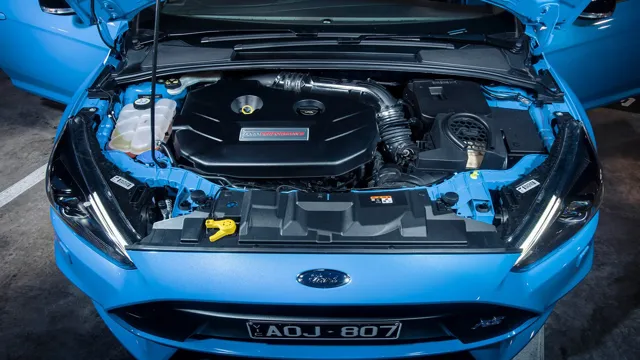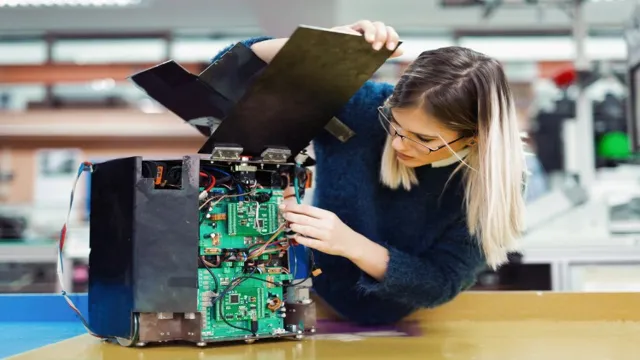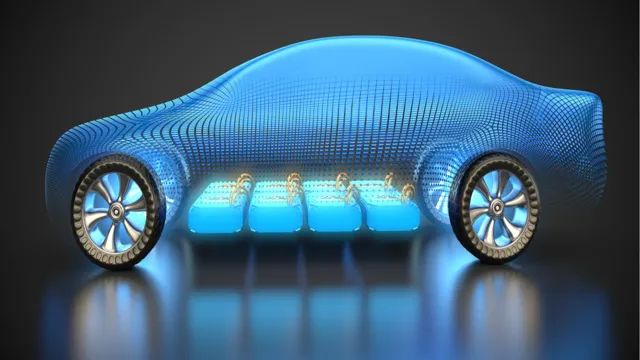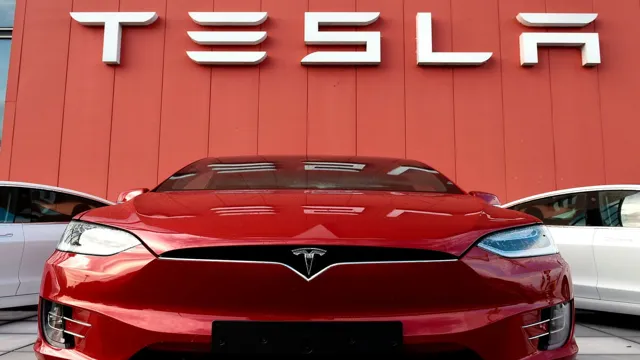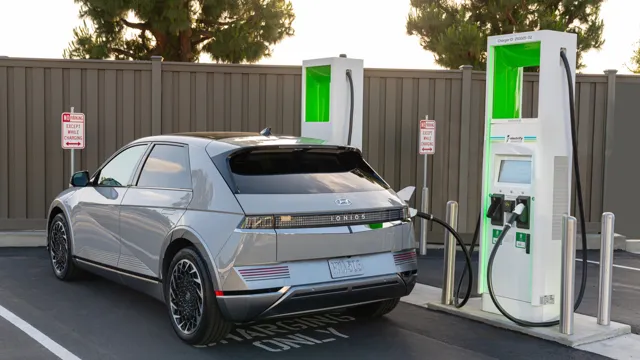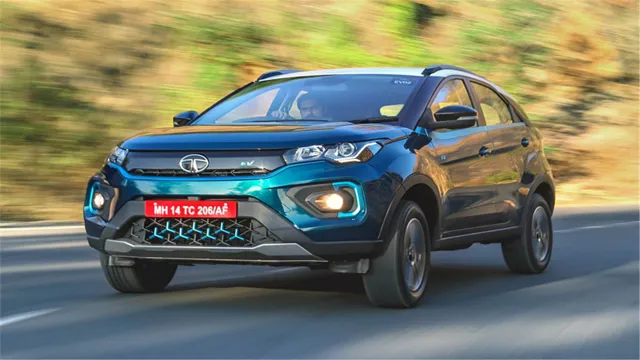Revolutionizing the Road: Exploring Ford’s Cutting-Edge Battery Technology for Electric Cars
Ford’s latest breakthrough in battery technology is making waves in the automotive industry. With the launch of its new all-electric Mustang Mach-E, Ford has revolutionized the electric car market with its state-of-the-art battery technology. This game-changing innovation has the potential to transform the electric car industry and pave the way for a more sustainable future.
The new battery technology boasts an extended range of up to 300 miles on a single charge, making it a viable solution for long-distance travel. The battery can also be recharged up to 80% in just 45 minutes, making it more convenient and accessible than ever before. But what makes Ford’s battery technology truly groundbreaking is its lower cost and higher energy density.
The technology incorporates a new type of lithium-ion battery cell, which uses less rare earth materials, reducing the overall production cost. Additionally, the batteries have a higher energy density, allowing for more power to be stored in a smaller space. This innovative technology has the ability to change the way consumers perceive electric cars, making them a more practical and affordable option for everyday use.
It could also potentially pave the way for a more sustainable future, as electric cars become a more attractive option, reducing our dependence on fossil fuels. As the automotive industry grapples with the challenges of climate change and sustainability, Ford’s game-changing battery technology is an exciting development that signals a brighter future. With the potential to transform the electric car industry and make a sustainable future more attainable, Ford’s battery technology is a game-changer that all consumers and environmentally-conscious individuals should keep an eye on.
Revolutionizing Electric Cars
Ford is leading the revolution in electric cars with their innovative battery technology. Their recent announcement of a new battery platform that promises extended range and improved performance is a game-changer for the industry. Compared to the current battery models, the new battery promises 40% more range, faster charging times, and lower costs to manufacture.
This is a significant leap forward in the development of electric cars, and it puts Ford at the forefront of the push towards a more sustainable future. The company’s focus on battery technology is a great example of their commitment to innovation and environmental consciousness. With the new batteries, drivers can have more confidence in their electric cars and their ability to travel longer distances without the need for frequent recharging.
The new batteries reflect Ford’s dedication to improving the electric car experience for drivers, making it more viable and convenient.
High-performing Battery Technology
Electric cars have come a long way since their early days of limited range and unreliable battery technology. Now, with the advent of high-performing battery technology, we’re seeing a revolution in the world of electric cars. Not only are these batteries more powerful and efficient than ever before, but they’re also more affordable, making them accessible to a wider range of people.
One of the most exciting things about these new batteries is their ability to charge quickly, meaning that drivers no longer have to spend hours waiting for their cars to recharge. The days of “range anxiety” are also becoming a thing of the past, thanks to batteries that can keep cars running for longer than ever before. Additionally, these batteries are more environmentally friendly than traditional gas-powered vehicles, making them a great choice for anyone looking to reduce their carbon footprint.
By choosing an electric car with a high-performing battery, you can help protect the planet while still enjoying all the benefits of a modern, high-tech vehicle. In conclusion, the development of high-performing battery technology is truly revolutionizing the world of electric cars. With these new batteries, drivers can enjoy greater efficiency, faster charging times, and longer ranges, all while doing their part to protect the environment.
So why not consider making the switch to an electric car? You might be surprised at just how much you’ll love it.
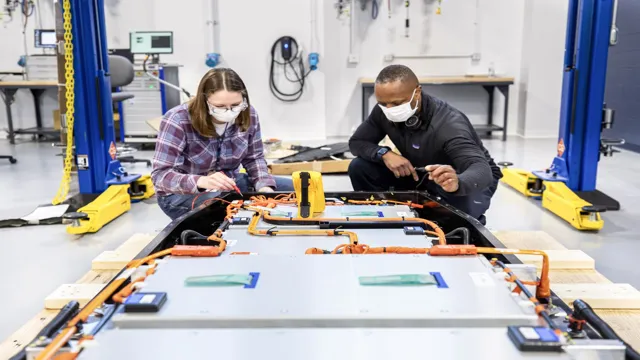
Advanced Lithium-ion Battery Technology
Electric Cars Advanced lithium-ion battery technology has revolutionized the way we think about electric cars. With the development of these high-tech batteries, electric cars are becoming more practical and affordable for everyday use. Instead of the limited range and long charging times of older models, newer electric cars are now capable of extended ranges, quick charging capabilities, and improved safety features.
These batteries are also more environmentally friendly than traditional gas-powered vehicles, as they produce zero emissions and require less maintenance. As a result, more and more people are considering making the switch to electric cars as a way to reduce their carbon footprint and save money in the long run. The future of transportation is looking brighter than ever, thanks to the continued advancements in lithium-ion battery technology.
Longer Rides with More Efficiency
Ford’s latest battery technology for electric cars promises to revolutionize the way we travel long distances. With its innovative design, the battery is capable of providing more efficient and longer-lasting energy, making road trips possible without worrying about running out of power mid-journey. The new technology is a significant step forward in the development of electric cars, which previously struggled to match the range and speed of traditional fuel-powered vehicles.
Ford’s commitment to sustainability and reducing carbon emissions is admirable, and their battery technology will undoubtedly have a significant impact on the environment. As electric cars become more popular, it is exciting to see the advancements in battery technology make them a practical and efficient option for long-distance travel. Exciting times are ahead for electric car enthusiasts, and it’s encouraging to see companies like Ford leading the charge towards a greener future.
Increased Driving Range
With the continuous advancements in technology, electric vehicles have come a long way since their inception. One feature that has improved extensively is their driving range. In the past, electric cars could barely make it 100 miles before needing to recharge.
However, with new battery technologies on the market, electric vehicles can now travel up to 400 miles on a single charge. This increased driving range not only provides drivers with the freedom to travel long distances without worrying about running out of power but also offers more efficiency. Charging times have been reduced, making it easier to get back on the road quickly.
Additionally, longer driving ranges mean fewer charges, which results in fewer maintenance costs. With these innovative technologies, electric vehicles are becoming a more practical and environmentally friendly alternative to traditional gas-powered vehicles. So, why not make the switch today and experience the benefits of a longer driving range?
Faster Charging Times
As electric vehicles become more mainstream, one of the biggest challenges faced by EV owners is the time it takes to charge their vehicles. But with advancements in technology, faster charging times are becoming a reality. This means that EV owners can enjoy longer rides with more efficiency, without worrying about running out of battery.
With high-power chargers, the time it takes to charge an EV can be reduced significantly, and with the development of new battery technology, the range of EVs is also increasing. One way to achieve faster charging times is through the use of fast chargers which are becoming increasingly available in public spaces. The deployment of fast chargers will enable increased adoption of EVs by removing range anxiety and enhancing the overall driving experience.
So, if you’re thinking of switching to an EV, rest assured that with faster charging times, you can now enjoy longer rides with more efficiency.
Improved Battery Durability
Improved Battery Durability Are you tired of your e-bike battery running out of juice mid-ride? Well, fear not, because battery durability has vastly improved in recent years. Thanks to advancements in battery technology, e-bike riders can now enjoy longer rides with more efficiency. These improved batteries have a longer lifespan and can hold a charge for a longer period of time.
This means you can ride for longer distances without worrying about your battery dying out. Not to mention, you’ll save money in the long run by not having to replace your battery as frequently. So, whether you’re commuting to work or hitting the trails, improved battery durability means you can enjoy your ride without any interruptions.
Say farewell to battery anxiety and hello to longer, smoother rides.
Cost-Effective Solution
If you are looking for a cost-effective solution to buy an electric car, then Ford may have the answer for you. Ford has been working on improving its battery technology for years, resulting in the development of several affordable electric cars. The latest model, the Mustang Mach-E, uses a new battery technology that can provide a range of up to 300 miles on a single charge.
This is a significant improvement over older electric cars that struggled to give a range of more than 100 miles on a single charge. The Mustang Mach-E also features fast-charging capability that can provide up to 61 miles of range in just ten minutes of charging time. This means that you can quickly top up the battery and carry on with your journey without any interruptions.
Overall, Ford’s battery technology is an impressive feat that allows them to produce affordable electric cars that can compete with more expensive models. So, if you’re in the market for an electric car, give Ford’s lineup a closer look.
Reduced Battery Production Costs
Reduced battery production costs are a game-changer for the industry, and a cost-effective solution is essential to keep up with the competition. With advances in technology, manufacturers are finding new ways to reduce the cost of producing batteries without sacrificing quality. From utilizing recycled materials to developing more efficient production methods, these innovations are creating opportunities to achieve more with fewer resources.
For example, one company has developed a process that uses water instead of solvents to create lithium-ion batteries, reducing production costs by up to 90%. By finding ways to lower costs, both manufacturers and consumers benefit, as products become more affordable and accessible. This shift towards cost-effectiveness is critical for the industry to continue to grow and innovate, and it’s exciting to see what the future holds.
Increased Affordability for Electric Cars
Electric cars have become more affordable over the years, making them a cost-effective solution for eco-conscious buyers. With advancements in technology and an increase in competition among manufacturers, prices have reduced significantly in recent times. This trend is expected to continue, and as production scales up, costs will inevitably go down further.
Additionally, government incentives, tax credits, and subsidies have also played a role in encouraging more people to invest in electric vehicles. Furthermore, electric cars have lower operating costs than traditional fossil fuel-powered cars, meaning that buyers are saving money in the long run on fuel, maintenance, and repair costs. As a result, more households are considering EVs as a viable option, and this shift towards clean energy is likely to accelerate in the coming years.
As the air quality continues to deteriorate, investing in an affordable electric car makes more financial sense now than ever before.
The Future of Electric Cars
As the world becomes more focused on reducing carbon emissions, the demand for electric vehicles is constantly increasing. Ford has been investing heavily in battery technology to ensure they are at the forefront of this shift towards sustainable transportation. Their latest electric car, the Mustang Mach-E, boasts an impressive range of up to 300 miles on a single charge.
Ford has also recently invested in solid-state battery technology, which could allow for faster charging times and even longer driving ranges. The future of electric cars is looking bright, and Ford is surely going to be a major player in the industry. With their commitment to sustainability and innovation, we can expect exciting advancements in battery technology and electric cars from Ford in the coming years.
Conclusion
In conclusion, it’s clear that Ford has embraced the future of automotive technology with their innovative battery technology for electric cars. With a focus on sustainability and efficiency, they’re paving the way for a cleaner, greener world. So while we may not be flying around in hovercars just yet, we can take comfort in the fact that Ford is leading the charge towards a brighter, more sustainable future for all of us.
And who knows, with their commitment to constantly improving their technology, maybe a flying Ford electric car isn’t too far off after all!”
FAQs
How does Ford’s battery technology differ from other electric car manufacturers?
Ford uses lithium-ion batteries with a unique battery management system that optimizes performance and extends battery life, while also offering fast charging capabilities.
What is the range of Ford’s electric cars?
The range of Ford electric cars varies depending on the model, with the Mustang Mach-E having a range of up to 300 miles on a single charge.
How long does it take to charge a Ford electric car?
The charging time for Ford electric cars varies depending on the battery size and charging method, with a standard 120V outlet taking up to 29 hours to fully charge, while a 240V home charging station can charge in as little as 10 hours.
Does Ford offer any incentives for purchasing an electric car?
Yes, Ford offers various incentives and rebates for purchasing their electric cars, such as federal tax credits and state-specific incentives for electric vehicle purchases.

